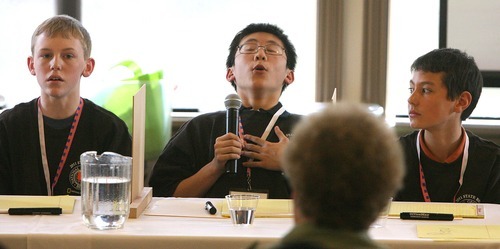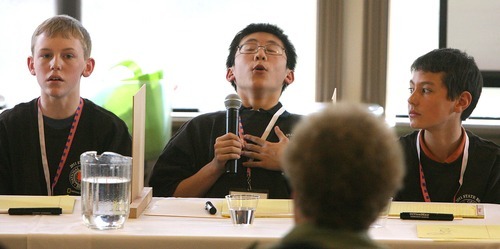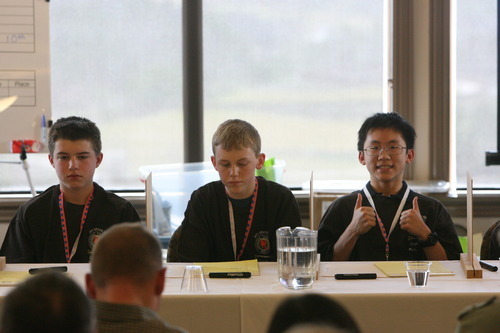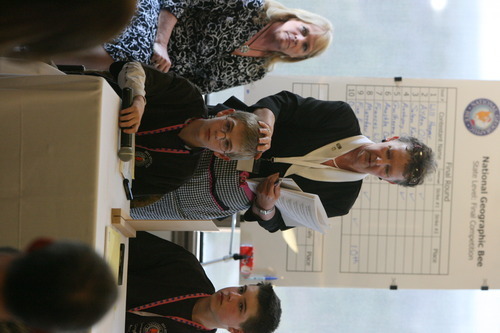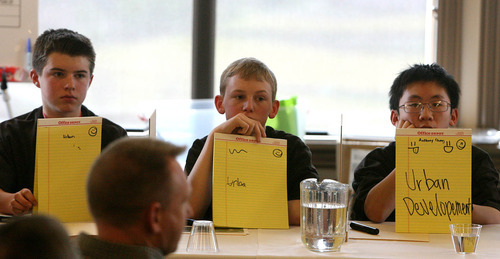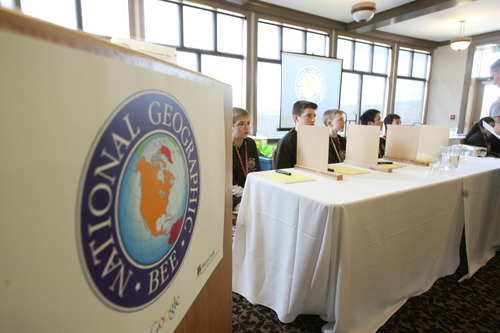This is an archived article that was published on sltrib.com in 2011, and information in the article may be outdated. It is provided only for personal research purposes and may not be reprinted.
Lehi • There isn't a corner of the globe seventh-grader Anthony Cheng hasn't studied, absorbed and committed to memory.
The Midvale Middle School student's head is full of vivid maps and information about everywhere from Siberia to Seattle. He knows obscure rivers and little-known mountain ranges, and he can't be stumped on capitals.
Anthony won his second straight statewide National Geographic Bee title last week at Thanksgiving Point in Lehi, besting nearly 100 school champs in grades 4 through 8 from across the state. He'll represent Utah at the national competition in Washington, D.C., May 24-25. Last year, he placed sixth, the best-ever finish for a Utah contestant.
"I was wondering, 'Did I really win again?', because Will is so good," Anthony said.
Will Hooper, a Bonneville Elementary sixth-grader and World War II buff, placed second behind Anthony for the second straight year.
"We need Anthony Cheng to come in first, second or third at nationals so he won't be able to come back next year," quipped Will's mother, Heidi Hooper, citing one of the bee's rules.
Anthony has a good shot at a top-three finish. He has been there, he knows how it works, and the mystique of the Alex Trebek-hosted event has worn off.
"I definitely feel more confident," he said, "but I think the competition is going to get harder this year."
Anthony, a math whiz and pianist, said geography is more important than ever.
"The world is becoming increasingly connected," he said, "so in order to keep up with that, you have to know where everyone is."
Guilherme Vendemiatti, an Early Light Academy student, said he watches TV news with his family to learn what's happening throughout the world.
He said it's vital for kids to learn geography "so we can work better with other people in other countries and they can work with us so we can make a better planet together."
Utah National Geographic Bee director Sheila Keller-Powell couldn't agree more. The longtime geography advocate is concerned with how the subject is taught in Utah schools, or more accurately, how it's not. While students learn some geography throughout elementary school and junior high, it's embedded into the social studies curriculum. Utah students don't take a formal world geography class until ninth grade. Some districts teach it for a year, but most opt for one semester.
"I think that's sad," Keller-Powell said. "I mean, a lot of the other industrialized countries have multiple years of geography."
Keller-Powell has led the bee for each of its 23 years and is stepping down after this year. The kids never stop amazing her. "I taught sixth-grade geography for years, and holy cow, these questions blow my mind."
She said bee contestants are curious kids who are thirsty for knowledge. They're avid readers who bury their noses in atlases for fun, and they keep up with current events.
Frances Willberg, a Salt Lake Center for Science student who took fourth place, says her "love of history" has helped with her geography knowledge.
"I like researching the past peoples and languages that have been in certain places in the world," Frances said.
It doesn't hurt that she has lived in Oklahoma, Texas, Arizona and Russia. "With my dad's job, we move around a lot," she explained.
Girls performed well at the bee this year. Believe it or not, a girl has never won the Utah National Geographic Bee, and only two girls have won the nationwide contest in its 23 years, Keller-Powell said. Girls usually make up 10 percent to 15 percent of contestants at the Utah competition, but this year, 23 percent of the field was female. For the first time, two girls were among the top five finishers.
"That was so exciting," Keller-Powell said, noting education researchers have studied why girls don't do nearly as well as boys in geography bees. She speculated that boys may receive more encouragement at an early age to discover the world. She also said she has seen girls purposely miss questions so they wouldn't have to compete against boys.
Test your geography knowledge with these questions from the bee
1 • Manassas and Fredericksburg are Civil War battle sites in what state?
2 • Which state does not border another country: Delaware, Arizona or New York?
3 • The smallest independent country is an enclave within what capital city?
4 • What country, formerly known as British Honduras, gained independence in 1981 but was not recognized by neighboring Guatemala until the early 1990s?
5 • Spain's largest port city hosted the Summer Olympic Games in 1992. Name this Mediterranean city.
Answers • 1. Virginia 2. Delaware 3. Rome 4. Belize 5. Barcelona. —
Utah's National Geographic Bee Top 10
Winner • Anthony Cheng, Midvale Middle School, $100 prize
Runner-up • Will Hooper, Bonneville Elementary, Salt Lake City, $75 prize
3rd place • Guilherme Vendemiatti, Early Light Academy, South Jordan, $50 prize
4th place • Frances Willberg, Salt Lake Center for Science, Salt Lake City
4th place • Anushka Dasgupta, West High School, Salt Lake City
6th place • Matthew Klvacek, Elk Ridge Middle School, South Jordan
7th place • Salem Karren, North Cache 8-9 Center, Richmond
8th place • Ayden Olsen, Farmington Junior High
8th place • Dylan Moss, Eastmont Middle School, Sandy
10th place • Finn Epperson-Valum, Dilworth Elementary, Salt Lake City —
Bee champs from Valley West schools
Cheyenne Olsen, Copper Hills Elementary, Magna
Bence Sontos, Calvin Smith Elementary, Taylorsville
Caroline Esparza, Hillside Elementary, West Valley City


